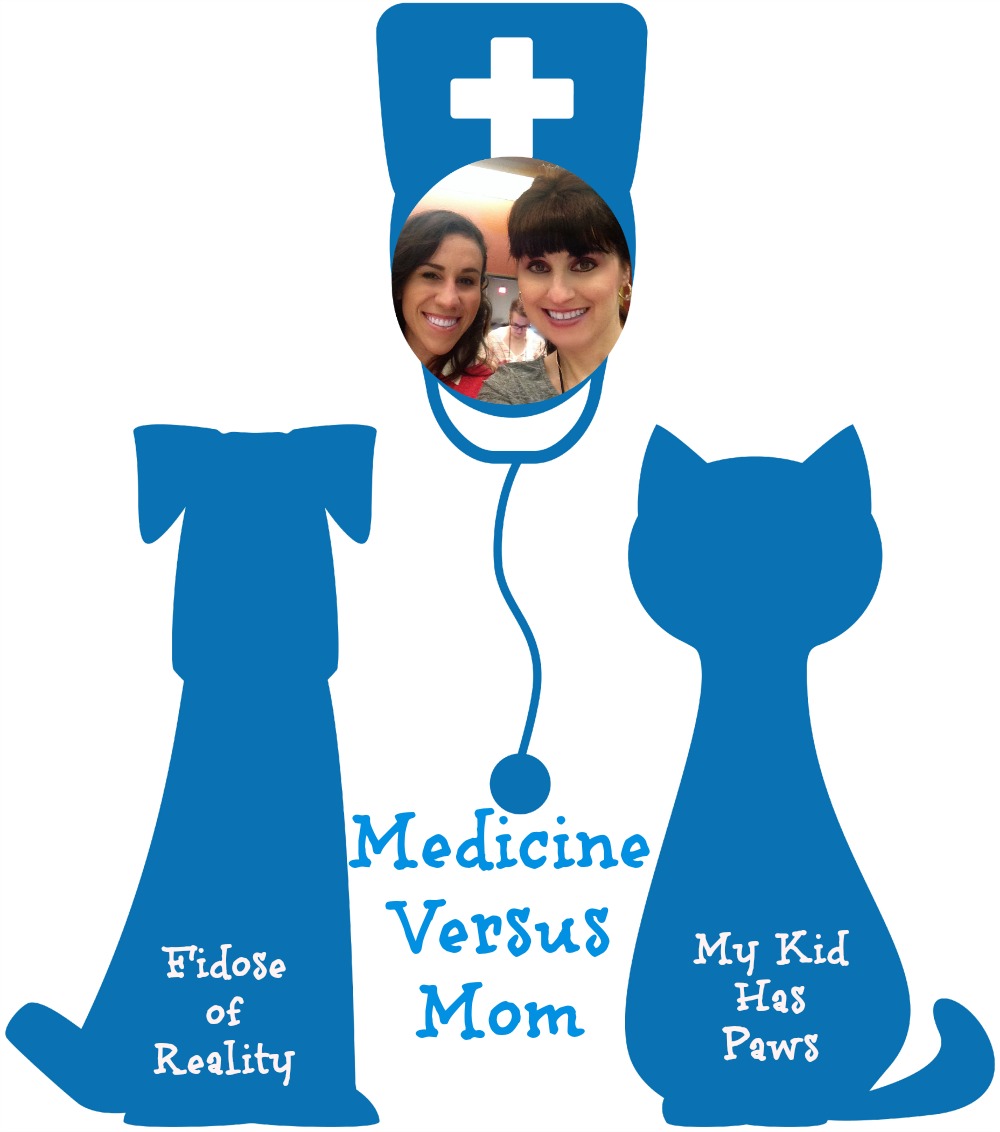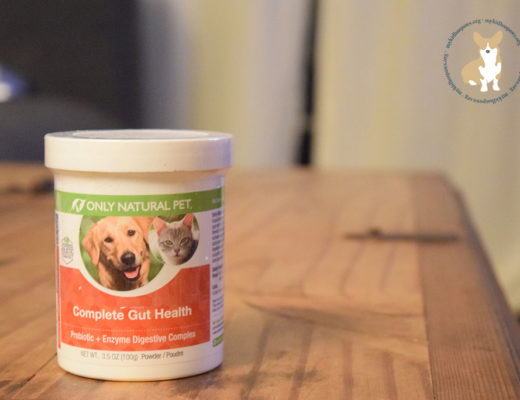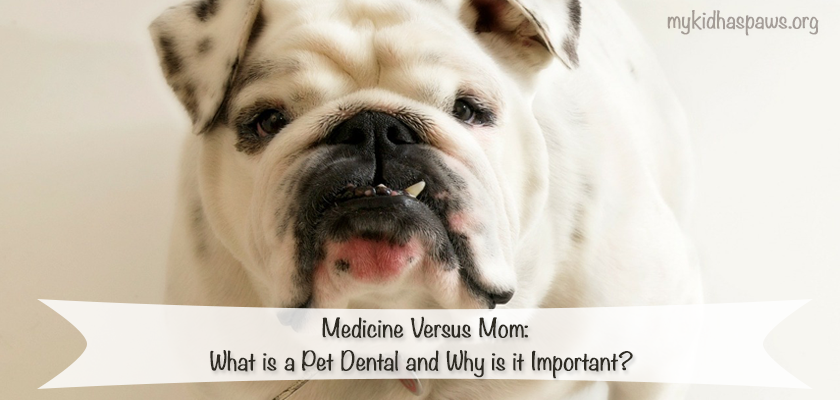Medicine versus Mom is back to discuss another very important topic for pets; probiotics!
As a pet parent, you are probably receiving health information from a variety of sources; family & friends, pet blogs (oh, hey!), groomers, pet sitters, veterinarians, veterinary technicians, pet store owners & professionals, holistic veterinarians, integrated health veterinarians, and the list goes on…
When it comes to certain topics like food, or health additives like probiotics, you might hear a lot of different opinions. So today, we would like to provide you with information that can help you make the most informed decision for your pet!
The Importance of Digestive Health
Gastrointestinal upset was a very common symptom for many of the patients I saw at the veterinary hospital. In fact, no matter the reason for the visit, we always asked if a pet had recently had any vomiting or diarrhea. Why? Because any sign of gastronintestinal upset indicated potentially serious health problems for the pet. According to Healthy Pets with Dr. Karen Becker, it is important to understand two critical points about the GI tract:
- “The gastrointestinal system must be healthy to avoid disease.”
- “The GI tract is the body’s number one barrier to disease and disease processes.”
Dr. Becker clearly states that in order for a pet to be healthy, their GI tract should be healthy too! In some cases, this is where probiotics can help.
What are probiotics?
According to Nestle Purina, who makes one of the probiotic products I am most familiar with, FortiFlora, probiotics are defined as:
Probiotics are live microorganisms similar to those found naturally in the intestines, which help maintain balance in the digestive tract. After being consumed, they help to inhibit harmful pathogens from colonizing the GI tract.
The most important thing for you to know as a pet parent is that probiotics can do 3 things for your pet:
- Improve food digestion
- Assist and boost the immune system
- Help your pet absorb more nutrients
Although probiotics can be very helpful to your pet’s immune system and integral to their overall health, it is important to not add probiotics to your pet’s diet as a solution to health issues without first discussing with your veterinarian.
Does my pet need probiotics?
This is an excellent question!
If your pet has any of the following symptoms, it might be worth discussing probiotics with your veterinarian:
Vomiting, Diarrhea, Constipation, or Excessive gas
brought on by:
- Stress
- Dietary problems
- Changes in food
- Antibiotics
The important thing to remember here is that probiotics are not always the solution to vomiting, diarrhea, constipation, or excessive gas. If your pet is having these symptoms, a variety of issues could be causing these problems and should be discussed with your veterinarian to rule out other health issues before determining GI imbalance.
What you might not know is that probiotics are present in some pet food recipes, so your pet might already have some probiotics protecting their GI tract. Additionally, some food recipes contain prebiotics which provide food for the good bacteria in your pet’s GI tract. My point is that your pet might already be benefiting from probiotics, the question is, do they need more?
Are probiotics considered a treatment or prevention?
Another great question! In my experience, probiotics are a treatment and potentially a long-term preventative solution. However, as mentioned above, some veterinary and pet professionals might disagree with me.
According to The Whole Dog Journal, all pets can benefit from probiotics. Additionally, some research supports using them proactively during times of stress (i.e. boarding) or after antibiotics. This could be true, but I will once again caution every pet parent to discuss with their veterinarian prior to adding anything to your pet’s diet and overall health plan.
Are all probiotic products created equal?
The answer here is, no!
Not only are all probiotics different from one another, but all pet digestive systems are different. While many of the same types of bacteria are seen in pets, some pets might have a different mix of bacteria than others! Why is this so important?
One of the fundamental rules of holistic pet care is to always remember that no two animals are alike. – The Whole Dog Journal
In a story from The Whole Dog Journal, a pet parent named Tina provides nothing but the absolute best for her Standard Poodle, Curly. However, despite top of the line food and probiotics, Curly is thin, not putting on weight, and having trouble with bowel movements. While there were perhaps a variety of reasons why Curly’s mix of probiotics didn’t work for him, the most important takeaway for any pet parent is that probiotics are not all made equal.
If you are still not convinced, here is a quote from a 2012 article written by the Veterinary Practice News:
Not all probiotics sold in the veterinary market have evidence to support their claims, so veterinarians should make sure that the levels of microorganisms are guaranteed and that the manufacturer can provide support of efficacy. – Grace Long, DVM, MS, MBA, Director of Veterinary Technical Marketing for Nestlé Purina PetCare in St. Louis
What can you do as a pet parent?
- Remember, probiotics are an option and a potential additive for treatment of specific GI symptoms.
- Always discuss probiotics with your veterinarian!
- Make sure that you store your probiotics correctly!
The most effective way of keeping probiotics alive in the packaging process is in a cool, dry environment away from air exposure. – Grace Long, DVM, MS, MBA, Director of Veterinary Technical Marketing for Nestlé Purina PetCare in St. Louis
Do you use probiotics for your pet? If so, what brand? Any tips for other pet parents?
For Carol’s Dog Mom perspective on this topic, please visit FidoseofReality.com!





Two French Bulldogs
August 23, 2016 at 8:03 amGood info. Since I have lots of stomach issues mom always wondered about using probiotics. Right now a supplement and cooking for me is working
Snorts,
Lily & Edward
M. K. Clinton
August 23, 2016 at 3:05 pmI have been looking into probiotics for the boys. Bentley had some prescribed a few months back and I thought it would be great to continue with them
M. K. Clinton recently posted…BFTB NETWoof News August 22, 2016
Rachel
August 24, 2016 at 12:58 pmThank you for sharing! Do you mind me asking why he had the probiotics? Say Hi to Bentley & Pierre for me!!
Leigh
August 26, 2016 at 7:44 pmWe hear a lot about probiotics for humans, but it’s important too to remember that dogs can benefit from ones made just for them too. Great information here!
Leigh recently posted…10 Cute & Lazy Dog Breeds You Need
Olivia
August 29, 2016 at 6:27 am3 bum swings! 3 more!
We sure do use a probiotic! We use AlphaOmega Probiotic 8 Plus.
My huMom has talked to both my pawsome Veterinarian & the makers of this product.
Dr. Gordon Chang has a Ph.D. in physiology from the University of Toronto, Institute of Biomedical Engineering. Omega Alpha manufactures supplements based on proven scientific research and testing.
Nose nudges,
CEO Olivia
Groovy Goldendoodles
August 30, 2016 at 3:50 amA serious case of Giardia when Harley was a puppy has had him on probiotics most of his early years. I’ve used Forti Flora but have since moved to more natural solutions. I believe in it’s purpose and have seen it make a HUGE difference with Harley. Nice post!